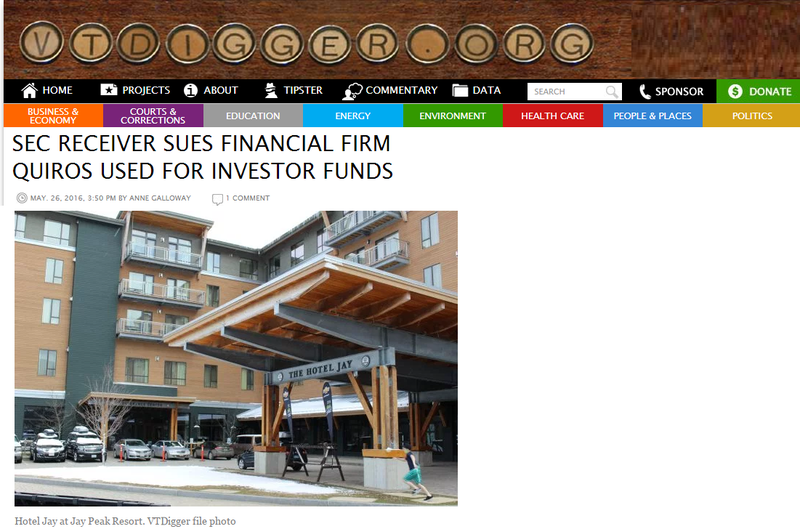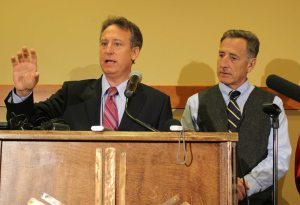SEC Receiver Sues Financial Firm Quiros Used For Investor Funds
Michael Goldberg, the court-appointed receiver in the Northeast Kingdom fraud case, is suing Raymond James Financial Inc. to recover money allegedly stolen from immigrant investors in Jay Peak and Q Burke resorts and a biomedical facility that was to be built in Newport.
Goldberg alleges that Raymond James “aided and abetted” developer Ariel Quiros in a Ponzi-like scheme in which he misused $200 million in investor funds, including stealing $55 million. The Securities and Exchange Commission last month charged Quiros and his partner, Bill Stenger, with 52 counts of fraud in the U.S. District Court of South Florida.
Judge Darrin Gayles froze all of Quiros’ assets and named Goldberg as the receiver in control of commercial properties in Vermont owned by Quiros.
The lawsuit Goldberg filed Friday accuses the financial services company and Joel Burstein, a former employee who used to be the son-in-law of Quiros, of helping the Miami businessman develop a scheme to commingle and “steal investors’ funds for his own use in breach of partnership agreements.” Goldberg is asking for a jury trial.
Goldberg alleges that Stenger and Quiros funneled investors’ money through accounts at Raymond James.
More than 700 investors from 74 countries invested $500,000 each, totaling roughly $350 million, in seven different Jay Peak limited partnerships. (The eighth offering, Q Burke Hotel and Conference Center, is the subject of a related SEC lawsuit.) Under the EB-5 program, qualified immigrants are eligible for permanent U.S. residency in exchange for investing in the projects.
As the receiver, Goldberg’s primary responsibility is to protect the interests of the investors. He has the authority to act as the owner of the properties, to investigate how Quiros conducted business, and to take legal action to recoup funds and assets that were “wrongfully misappropriated.”
Goldberg’s lawsuit is the latest in a string of legal actions against Raymond James. Two class action lawsuits have been filed by EB-5 investors seeking to recoup losses. And last week, a Vermont law firm sued Raymond James and People’s United Bank on behalf of investors.
Earlier this month, Alexander Daccache, an immigrant from Brazil who invested in the Penthouse Suites project at Jay Peak in 2010, filed the first class action lawsuit against Raymond James and Burstein. The lawsuit alleges Quiros “orchestrated” the fraud while Stenger, Burstein and Raymond James “enabled” the alleged fraud.
Raymond James, according to Daccache’s attorneys, allowed Quiros to create “an intricate web of transfers among various accounts at Raymond James to disguise the fact that most of the seven projects were either over budget or experiencing shortfalls.”
Goldberg has asked the court and Raymond James to consider consolidating his case with the Daccache lawsuit. Goldberg’s case makes similar arguments for investors in the seven Jay Peak projects that Quiros and Stenger promoted. The SEC receiver says Raymond James improperly converted money from six Jay Peak limited partnerships and the planned biomedical facility into collateral for loans and enabled Quiros and Stenger to “disguise the fact” that most of the seven projects “were either over budget or experiencing shortfalls.”
Goldberg alleges that Raymond James profited from the scheme, ultimately earning $2 million on margin loan interest.
The SEC says that from 2008 to 2016, Quiros allegedly embezzled $55 million in investor funds to finance a personal line of credit and the purchase of the Jay Peak and Burke resorts and two condos in Manhattan, and to pay down margin interest for loans set up through Raymond James.
Raymond James allowed Quiros to use investor funds as collateral for $105 million in margin loans over a three-year period, the SEC has alleged.
The SEC investigation shows that each limited partnership had an escrow account at People’s United Bank in Vermont. Stenger deposited investor money into the People’s account under the name of a particular project. As the investors were approved for temporary green cards, Stenger then transferred the money to a Raymond James account in Coral Gables, Florida, also set up in the name of the project.
Quiros had sole authority over the Raymond James accounts; Stenger had no signing authority. Burstein was the listed broker, according to the SEC.
The misuse of funds allegedly began in June 2008, when the SEC says Quiros stole investor money to purchase Jay Peak Resort from Mont Saint-Sauveur International. MSSI had collected $24.5 million from investors for an EB-5 program at Jay Peak. Stenger worked for MSSI at the time and oversaw the program as the principal of Jay Peak Management, the general partner of the Tram Haus (Phase I) and Hotel Jay (Phase II) projects. From December 2007 to May 2008, MSSI raised $17.5 million from 35 investors for Phase I and $7 million for Phase II.
In the spring of 2008, Quiros negotiated a stock transfer in which MSSI moved the assets of Jay Peak to his company, Q Resorts. In preparation for the closing on June 23, Quiros asked MSSI to open brokerage accounts for the Phase I and Phase II projects at Raymond James with Burstein, the lawsuit alleges. At the time of the bank transfer, MSSI said in a letter that the funds “may not be used in any manner, including as collateral or a guarantee, to fund the purchase of the Jay Peak Resort.”
Frank Amigo, Burstein’s supervisor and the current managing director for Raymond James’ South Florida complex, set up Quiros’ purchase of Jay Peak using a margin loan, Goldberg writes. Raymond James held investor money in Treasury bills and gave Quiros a loan based on 90 percent of the value of the T-bills. If Quiros didn’t pay back the margin loan, Raymond James could draw on the T-bills and recover what Quiros owed, Goldberg writes.
“Raymond James knew that the monies in the Jay Peak Limited Partnership accounts were investors’ funds and could not be used by Quiros for Quiros’ purchase of Jay Peak,” Goldberg writes. “Despite the fact that MSSI clearly explained to Quiros and Stenger that they could not use investor money to purchase Jay Peak, Quiros — aided by transfers made by Stenger and Burstein and Raymond James — did exactly that.”
Goldberg alleges that Quiros directly used $21.9 million in investor funds to pay for the purchase of Jay Peak, and later transferred an additional $5.5 million and $2.9 million from investor funds to a law firm representing Q Resorts.
Subsequent transfers between accounts at People’s United Bank and Raymond James followed a similar pattern, according to Goldberg and the SEC. Stenger approved transfers of investor funds from People’s to Raymond James that were solely held by Quiros, and in so doing, the SEC and Goldberg allege, he violated securities laws and abdicated his fiduciary responsibility to investors. In all seven phases of the Jay Peak projects, Quiros used money in investor accounts at Raymond James as collateral for margin loans, commingled funds and put limited partnership funds at risk, Goldberg writes.
In a deposition with the SEC, Quiros told investigators: “Raymond James was a great supporter of mine. They’re the ones who developed my banking structure in 2008.”
Goldberg alleges that Burstein and Raymond James had reason to know the transfers and margin loans made by Quiros and Stenger violated the terms of the limited partnership agreements and should have been aware of the restrictions MSSI placed on the use of investor funds.
As early as 2012, Raymond James and Burstein “were on notice” of emerging allegations in the press against Quiros and Stenger. Goldberg writes that Douglas Hulme, a former business consultant for Jay Peak, “warned immigration attorneys about the suspected use of funds and spoke with Peter Shumlin’s — the governor of Vermont — administration about his concerns.”
Goldberg alleges that Raymond James let Quiros use money that it knew he wasn’t supposed to use to buy Jay Peak from MSSI; that the bank set up margin loans for Quiros “to commingle and steal partnership funds”; and that it gave “carte blanche” to Quiros to do whatever he wanted with the money.
Goldberg asks the court to award compensatory damages, to be determined at trial, “at the maximum rate allowable.”
A third class action lawsuit against Raymond James was filed last week in the U.S. District Court of Vermont. The law firm Witten, Woolmington, Campbell and Bernal is representing an investor in Hotel Jay and two investors in the Stateside project at Jay Peak. The investors are also suing People’s United Bank.
Witten, Woolmington cites the SEC lawsuit and alleges that People’s United Bank and Raymond James officials were aware the Jay Peak developers were laundering money and “knowingly or recklessly” facilitated the transfer of millions of dollars from investors to accounts held by Quiros. People’s United, the attorneys allege, facilitated Quiros and Stenger’s breaches of fiduciary duty by releasing money from escrow accounts.
Earlier this month, the Financial Industry Regulatory Authority fined Raymond James $17 million for failing to prevent money laundering activity from 2011 to 2014. It’s the biggest fine ever handed down by FINRA, according to The Associated Press.
https://vtdigger.org/2016/05/26/sec-receiver-sues-financial-firm-quiros-used-for-investor-funds/
Mentions
- Vermont EB5 Regional Center
- Jay Peak - Q Burke Mountain Resort, Hotel and Conference Center L.P.
- Jay Peak Resort - Hotel Jay & Conference Center
- Jay Peak Resort - Tram Haus Lodge
- UNITED STATES SECURITIES AND EXCHANGE COMMISSION
- FINRA - Financial Industry Regulatory Authority
- Ariel Quiros
- Bill Stenger
- Peter Shumlin
- Joel Burstein
Litigation Cases
- MICHAEL I. GOLDBERG vs The AM Wealth Management Group of Raymond James & Ariel Quiros & Joel Burstein
- JAMES B. SHAW, JOHANNES EIJMBERTS, and LORNE MORRIS Individually and On Behalf of All Others Similarly Situated, vs The AM Wealth Management Group of Raymond James & Bill Stenger & Joel Burstein & Ariel Quiros
- State of Vermont vs Bill Stenger & Ariel Quiros
- UNITED STATES SECURITIES AND EXCHANGE COMMISSION vs Ariel Quiros & Bill Stenger
States
- Vermont
Videos





Subscribe for News
Site Digest
Join Professionals on EB5Projects.com →
Securities Disclaimer
This website is for informational purposes only and does not constitute an offer or solicitation to sell shares or securities. Any such offer or solicitation will be made only by means of an investment's confidential Offering Memorandum and in accordance with the terms of all applicable securities and other laws. This website does not constitute or form part of, and should not be construed as, any offer for sale or subscription of, or any invitation to offer to buy or subscribe for, any securities, nor should it or any part of it form the basis of, or be relied on in any connection with, any contract or commitment whatsoever. EB5Projects.com LLC and its affiliates expressly disclaim any and all responsibility for any direct or consequential loss or damage of any kind whatsoever arising directly or indirectly from: (i) reliance on any information contained in the website, (ii) any error, omission or inaccuracy in any such information or (iii) any action resulting therefrom.




